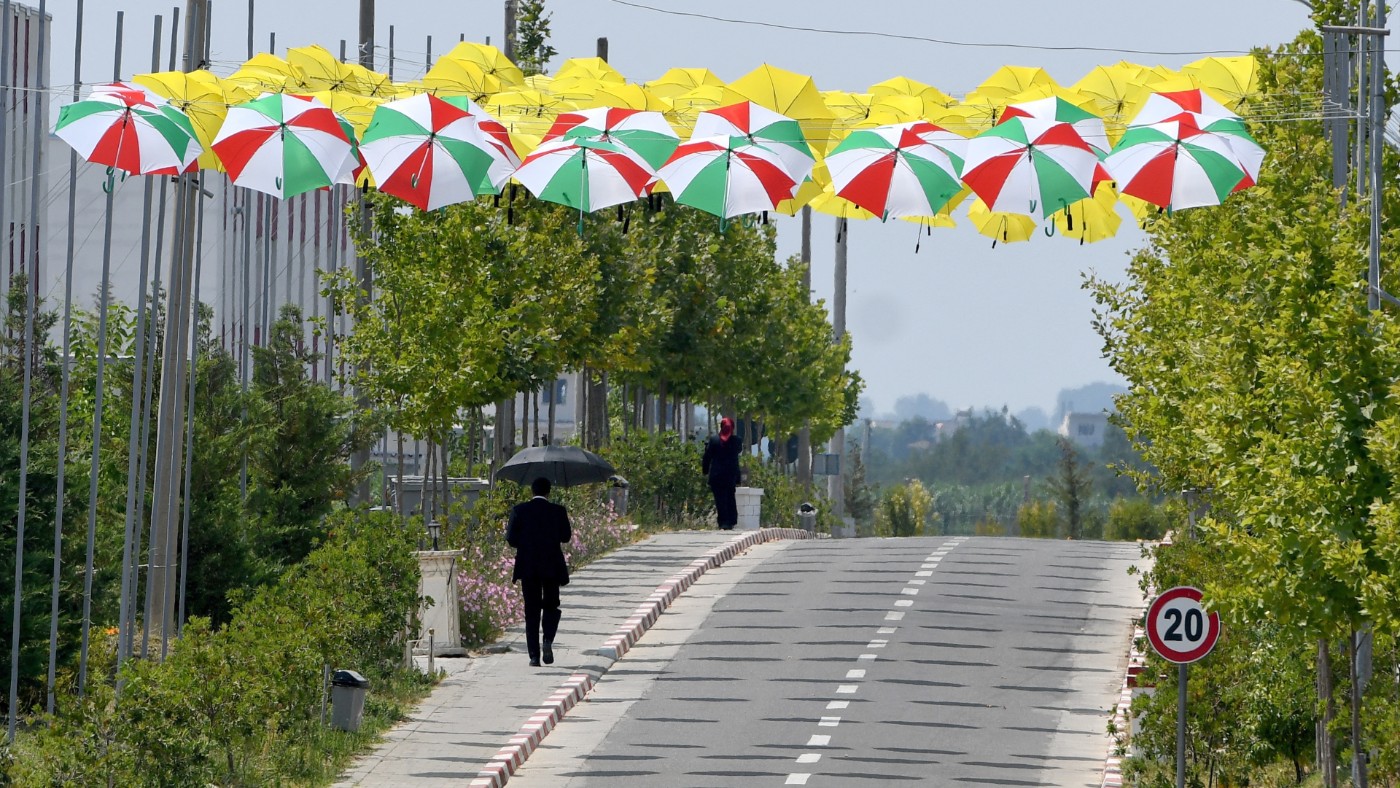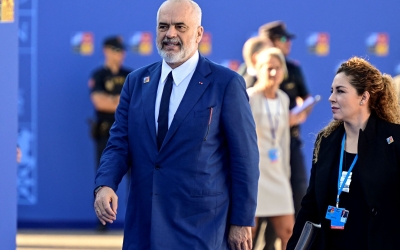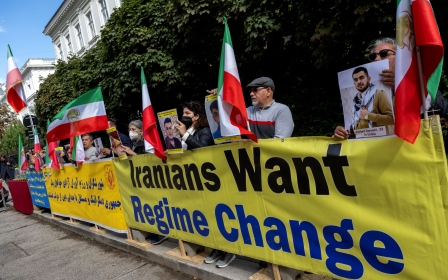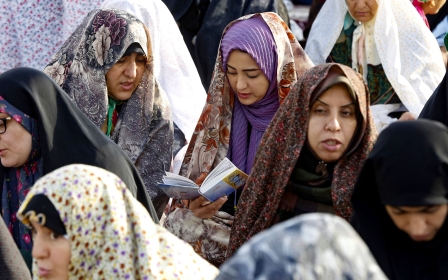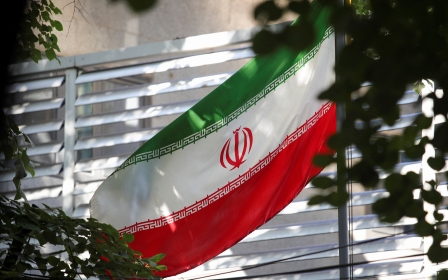Iran: Is Albania's clampdown on the MEK linked to nuclear deal?
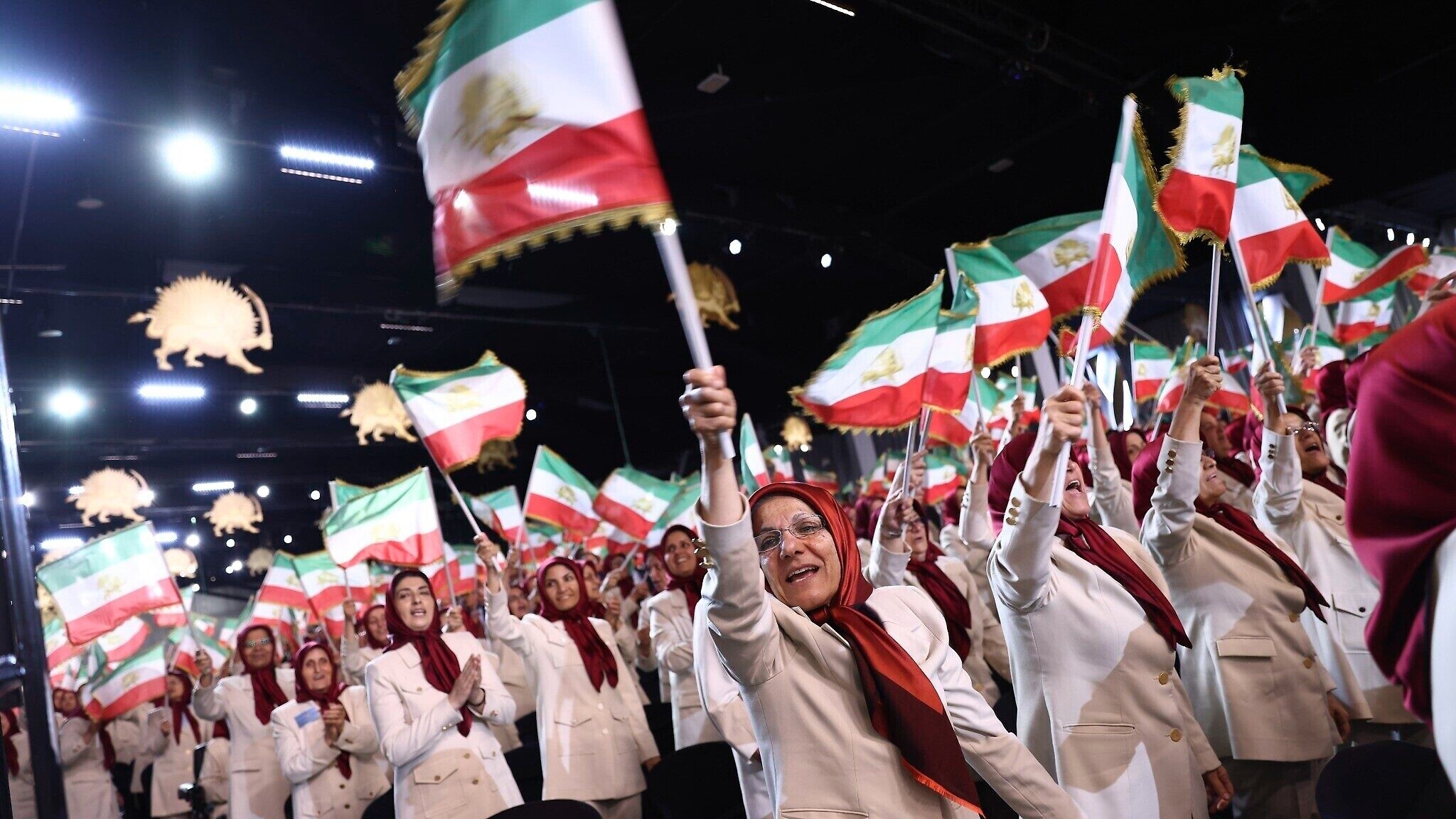
On Monday, Albanian authorities handed over hard drives and computers seized from the People's Mojahedin Organization of Iran (MEK) to their Iranian counterparts.
Albania has no diplomatic relations with Iran. Despite this, a series of recent moves against the opposition MEK, which operates in exile, has led many to wonder whether these actions are linked to the ongoing nuclear negotiations between the United States and Iran.
"There are negotiations between Iran and the EU and Iran and the US. It is easy for me to believe that Iran brings up the MEK issue with the West," Armin Montazeri, foreign policy editor at Ham-Mihan, an Iranian newspaper, told Middle East Eye.
Montazeri said he suspected that Iran and the US have "already reached some sort of agreement" about the MEK, which was unlikely to be publicly announced.
On 20 June, Albanian law enforcement raided the MEK's Ashraf 3 camp, citing concerns that the base northwest of the capital Tirana was being used for subversive political activities, cyberattacks against Iran and mass online trolling of opponents, in contravention of an agreement struck between the MEK and the Albanian government.
New MEE newsletter: Jerusalem Dispatch
Sign up to get the latest insights and analysis on Israel-Palestine, alongside Turkey Unpacked and other MEE newsletters
"I think they are at the beginning of the implementation phase," Montazeri said of the potential nuclear agreement.
The recent actions against the MEK can therefore be seen as a confidence-building measure between Iran and the US in addressing issues of mutual concern.
Following the raid on the MEK camp, US authorities released an unusually terse statement that was critical of the group.
"We support Albania's right to investigate any potential illegal activities within its territory," said a US State Department representative following the raid.
"The US doesn't see MEK as a viable democratic opposition movement that is representative of Iranian people. The US State Department continues to have serious concerns about MEK as an organisation, including allegations of abuse committed against its own members," it said.
That statement must have come as somewhat of a shock for a group accustomed to enjoying high-level support from US officials.
Included among those western politicians the MEK considers as allies are former British prime minister Liz Truss, who recently spoke at one of its events, US presidential candidate and former vice president Mike Pence, former senator Joseph Lieberman, Trump national security adviser John Bolton and a dozen sitting members of US Congress from both parties.
A state within a state
In a bid to appease Washington and curry political favour, Albania for years largely turned a blind eye to the activities of the MEK, which until 2012 was classified as a terrorist organisation by the US State Department.
As the group grew in confidence, buoyed by growing support from the US, it metastasized into a quasi-state within a state, with Albania as its base of operations.
"I think MEK being in Albania makes Tirana kind of responsible when it comes to the national security issues [facing Iran]," said Montazeri.
'The MEK is not necessarily an asset for the West against Iran. It is more like a tool, and using this tool has consequences for the West internally'
- Armin Montazeri, Journalist
"If MEK runs campaigns against Iran from Albania, which we know it has, then Iran has the right to respond in its own way," the Iranian journalist said.
In September, Albania faced a massive cyberattack on its government services, resulting in sensitive information being hacked.
Tirana accused Tehran of conducting the attack. It subsequently cut diplomatic ties with Iran.
The actions being taken by Albania now are also meant to "defend its own national security", said Montazeri.
"Obviously it does not want to be stuck in a war between Tehran and the MEK, whether it is cyberattacks or other kinds," he said.
More broadly, Albania found itself sleepwalking into a proxy war with Iran, not fully appreciating what housing the group could mean for the country.
"Note that the MEK is not necessarily an asset for the West against Iran. It is more like a tool, and using this tool has some consequences for the West internally," said Montazeri.
A tool against Iran
Albania's population, initially ambivalent about the presence of the group, now increasingly sees it as something it has not agreed to, Olsi Jazexhi, an Albanian academic who has been tracking MEK activities in his country, told MEE.
Jazexhi is convinced the current exchange with Iran is related to the nuclear agreement being hashed out by the two sides, which MEE reported for the first time last month.
"The MEK presence is problematic, because they have turned Albania into a base from where they launch terrorist attacks against a foreign country. They break Albanian laws and have created a state within a state in their paramilitary camp in Albania," said Jazexhi.
When Albanian police attempted to enter the Ashraf 3 camp with a warrant last month, the MEK resisted, resulting in injuries on both sides.
The actions of the opposition group, which was initially accepted by Albania on ostensibly humanitarian grounds, raises questions as to whether the group has reformed at all from its violent past.
"The Trump administration and Israel used the MEK to exert maximum pressure on Iran from 2018 to 2021," said Jazexhi. "But now, with Biden in office, the US administration does not want to have an ex-terrorist organisation, which has very strong ties with Trump officials, dictate its policies towards Iran."
Overstayed its welcome
Questions are now being raised about the MEK's continued existence in Albania, including why Prime Minister Edi Rama has not been more proactive in tackling the group.
"If Albania was indeed used as a launchpad for cyberattacks against Iran, it raises questions about why the Albanian government didn't react sooner to prevent escalation into a full-blown conflict with Iran," Mentor Beqa, professor of international politics at the Aleksander Moisiu University of Durres, told MEE from Albania.
Even France, which hosts MEK leader Maryam Rajavi, has recently clamped down on the group, denying its request to hold a large gathering this month.
The group, which needs such rallies to shore up its international visibility, is feeling the squeeze.
"The US's apparent reluctance to protect MEK members suggests a shift in its stance towards the group, potentially opening the door for their removal from Albania, albeit difficult under the current circumstances," Beqa said.
Beqa believes the Albanian government made a mistake in allowing the group to seclude itself in a camp away from prying eyes.
"Allowing the group to reside together in one camp and maintain its organisational structure might have been a misstep, as this may have facilitated the group's capacity to engage in activities that put Albania in a challenging position," he said.
Caught up in the movements of great powers, the Albanian government is now left needing to be clear about where it stands on the foreign group that has made Albania its home.
Middle East Eye delivers independent and unrivalled coverage and analysis of the Middle East, North Africa and beyond. To learn more about republishing this content and the associated fees, please fill out this form. More about MEE can be found here.


